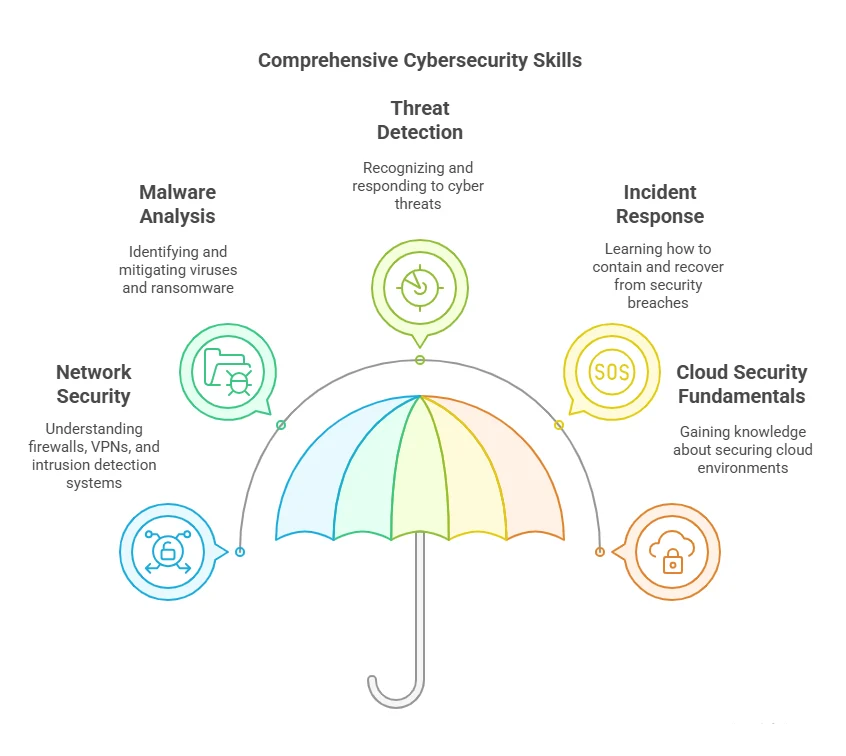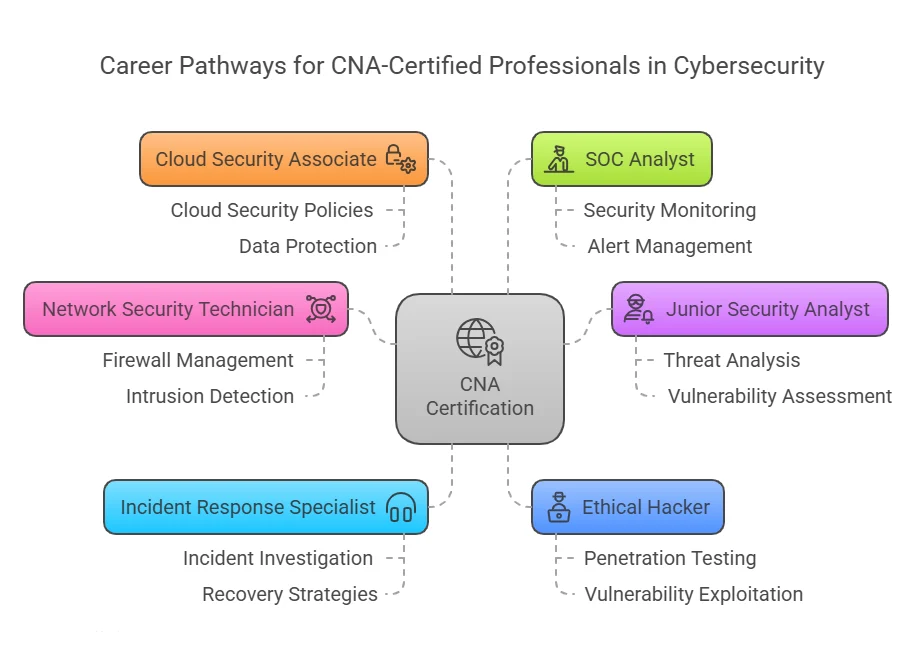The Certified Network Associate (CNA) certification is an entry-level credential that provides foundational knowledge and skills essential for a career in cybersecurity. It aligns well with the goals of individuals starting in IT or cybersecurity by validating core competencies such as network security, threat detection, and malware analysis. As cyber threats continue to grow in complexity, the CNA certification offers a practical pathway to enter the cybersecurity field and build a strong professional foundation.
Related Blog: Certification in Cyber Security: A Step-by-Step Guide
Career Advancement
Earning the CNA certification significantly improves your chances of securing entry-level cybersecurity roles such as network technician, junior security analyst, or IT support specialist. This certification demonstrates to employers that you have the essential skills to contribute effectively to protecting organizational systems. Additionally, CNA certification serves as a stepping stone for advancing to more specialized and higher-level roles, including incident response, ethical hacking, and cloud security positions.
Enhanced Skills and Expertise
The CNA certification equips you with critical cybersecurity skills that are highly valued in the industry, including:
- Network Security: Understanding firewalls, VPNs, and intrusion detection systems.
- Malware Analysis: Identifying and mitigating viruses, ransomware, and other malicious software.
- Threat Detection: Recognizing and responding to cyber threats and vulnerabilities.
- Incident Response: Learning how to contain and recover from security breaches.
- Cloud Security Fundamentals: Gaining knowledge about securing cloud environments.
These skills prepare you to handle real-world cybersecurity challenges effectively, making you a valuable asset to any organization.
Related Blog: Is CNA Certification Worth It for Cyber Security Careers?

Employer Perspective
Employers prefer candidates with certifications like CNA because it assures them of verified skills and knowledge. Certified professionals often require less training and can contribute more quickly to security initiatives. The CNA certification signals dedication to the profession and readiness to address cybersecurity challenges, helping you stand out in a competitive job market.
Salary Potential
Obtaining the CNA certification can positively impact your earning potential. Entry-level cybersecurity roles typically offer moderate salaries, but certified professionals often command higher wages than their non-certified peers. Certification can lead to salary increases ranging from 10% to 30%, reflecting the industry’s recognition of the value of certified skills.
Job Security
With the rising frequency and sophistication of cyber threats, the demand for cybersecurity professionals continues to grow. Holding a CNA certification enhances your employability and job security by proving you have the foundational skills necessary to protect digital assets. The cybersecurity workforce shortage means certified professionals enjoy strong job stability and numerous career opportunities.
Real-World Examples
Many cybersecurity professionals have used their CNA certification to accelerate their careers. Numerous individuals report securing their first cybersecurity roles shortly after certification and progressing to specialized positions such as ethical hacker or cloud security analyst. These success stories demonstrate how CNA certification can serve as a catalyst for career growth and salary improvements.
Career Pathways
CNA-certified professionals can pursue a variety of roles and specializations within cybersecurity, including:
- Network Security Technician
- Junior Security Analyst
- Incident Response Specialist
- Ethical Hacker (with further certification)
- Cloud Security Associate
- Security Operations Center (SOC) Analyst
The certification provides a solid foundation for further specialization and advanced certifications, supporting continuous career development.

Conclusion
The CNA certification is a valuable stepping stone for anyone looking to launch or advance their cybersecurity career. It provides essential skills, enhances employability, and opens doors to higher-paying roles in a rapidly growing industry. By earning the CNA certification, you position yourself for greater career opportunities and salary potential in 2025 and beyond. For expert guidance and comprehensive training to help you succeed, trust ACSMI to support your cybersecurity certification journey.
FAQs
- What skills does the CNA certification focus on?
It covers network security, malware analysis, threat detection, incident response, and cloud security fundamentals. - Is prior IT experience required to pursue CNA certification?
No, CNA certification is designed for beginners and does not require prior experience. - How soon can I find a job after earning CNA certification?
Many graduates secure entry-level cybersecurity roles within a few months, especially with career support services. - Does CNA certification increase salary potential?
Yes, certified professionals often earn 10%-30% more than non-certified peers in similar roles. - What career paths are available after CNA certification?
Roles include network security technician, junior analyst, incident responder, ethical hacker (with further training), and cloud security associate.

Leave a Reply